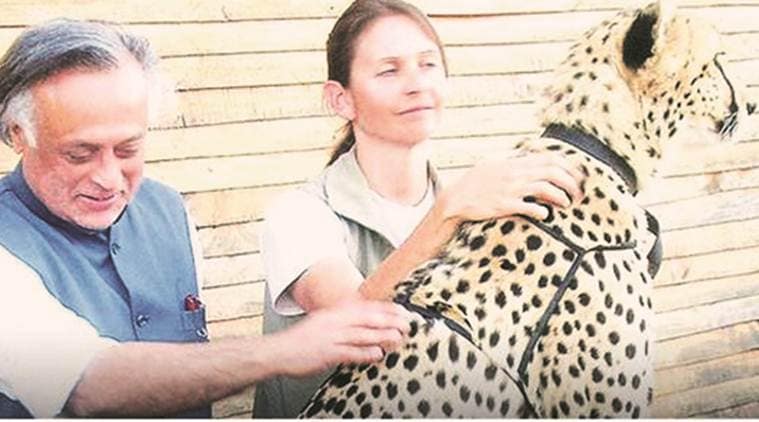 Jairam Ramesh, then Minister of State for Environment and Forests (Independent Charge), at the Cheetah Outreach Centre near Cape Town, South Africa in April, 2010. (File photo)
Jairam Ramesh, then Minister of State for Environment and Forests (Independent Charge), at the Cheetah Outreach Centre near Cape Town, South Africa in April, 2010. (File photo)
India on Tuesday reasserted that it was committed to reintroduce cheetah to the country even as some experts expressed reservations about wisdom of such a project instead of focusing on the surviving species. This comes two weeks after the Supreme Court gave its green signal to bring African cheetah to India and appointed a three-member committee to oversee it.
At the 13th Conference of Parties to the Convention on Conservation of Migratory Species of Wild Animals, Soumitra Dasgupta, inspector general of forests (wildlife) of India, said, “You name a species and India has done some work regarding the conservation of that species — tiger, elephant, rhinoceros, marine species. But unfortunately, we have lost one species — cheetah. It was considered to be extinct from Indian landscape in 1940s… The apex court has passed an order for reintroduction of cheetah in India. We are very hopeful that the introduction would take place very soon.”
He was addressing a side event on ‘Racing Extinction: Challenges in Cheetah Conservation and Importance of the African Carnivores Initiative’ on the second day of the CMS COP13 in Gandhinagar.
India had taken up the project of reintroducing cheetah in 2009. Government also identified Kuno Sanctuary in Madhya Pradesh, Nauradehi, also in MP, and Shahgarh in Rajasthan as potential areas for reintroduction of cheetahs.
However, the Supreme Court had applied brakes on the project in 2012. The Central government moved the Supreme Court in 2017 to allow reintroduction of cheetah. The SC, in its judgement passed on January 28 this year gave its green signal to the project and constituted a committee comprising India’s first director of wildlife, Dr MK Ranjitsinh, Wildlife Institute of India (WII) director Dhananjai Mohan and deputy inspector general of wildlife of India. The Court has asked the committee to file a progress report in four months.
Dasgupta said that the National Tiger Conservation Authority (NTCA) would implement the project. “We are highly optimistic that the species that we have lost will be introduced again… Once we receive recommendations from the committee, we shall allocate funds for the project,” said the IGF.
Susan Lieberman, vice-president of international policy with Wildlife Conservation Society, an international organisation working for wildlife conservation suggested that it would be more rational to focus on existing species. “…we have to also remember to maintain what we have… We need to remember that with reintroduction, people start thinking we can destroy what we have as we can always bring it back. But it can’t always be brought back. It is much cheaper to save what we have,” Lieberman observed.
Dr Ranjitsinh, who was present in the audience said, “We assure you it won’t be very costly. It is possible that we may lose some cheetahs while trying to reintroduce them in India. But at the same time, 300 cheetahs are hunted illegally in Africa every year and some are getting killed on roads,” he said.
Yadvendradev Jhala, dean of WII, the premier wildlife research institute run by the Indian government, said, “Restorative policy is a global norm…We have secured most of our protected areas where cheetah can be brought back.”